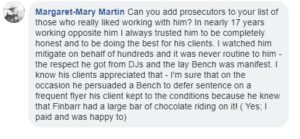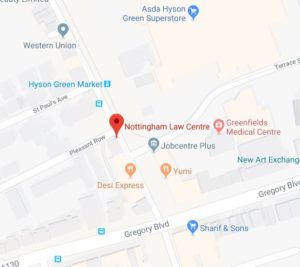Thursday 31 January 2019 was a notable date for the Nottingham legal community as local defence practitioner Finbarr Hennessy retired from practice.
Keeping a low profile
Although having spoken of a wish to retire for some time, his boundless enthusiasm for the job and wish to continue to provide representation for his longstanding client base meant that he continued to delay the inevitable.
In typical fashion, Finbarr sought to keep a low profile, and sought to avoid the (usually) inevitable collection, cards and farewell do. This he managed successfully.
Some thoughts on the changes to the job
Finbarr offered some thoughts on his departure from a job that he still loved:
“It seemed weird walking out of Nottingham Magistrates’ Court this afternoon after spending 23 years of my life in that building.
Video killed the radio star. Technology killed this out-dated solicitor.”
He confessed that he had “struggled since the day that speedy summary justice was introduced at the Magistrates’ Courts”, offering the view that “justice has gone out of the window to be replaced by “progress” and statistics. To get an adjournment is harder than keeping somebody out of prison.”
Additionally he identified that his “lack of technical expertise means that I am now less efficient than I was in 1995.”
Finbarr’s intention had been to ‘go out with a bang’, perhaps collapsing when bail was refused by the Magistrates or when a client had been wrongly sent to prison. Unfortunately for him “I have had good results recently, so my blood pressure has remained stable.”
His final assessment was “We are all replaceable. I only work 14 hours a week and I know that my position will easily be covered.”
No doubt his clients will beg to differ, and will recognise the lengths that he went to on their behalf. Clients and their families had his mobile number and he was effectively on call 24 hours a day, 7 days a week. If families were distressed by the situation that, particularly, youth clients had found themselves in he would visit families at home in his spare time to try and help.
Client feedback on Finbarr Hennessy
Finbarr was described in glowing terms by any number of clients – ‘The solicitor I have is very good at his job’, ‘A1 Service thank you’ and ‘Finbarr Hennessy is an excellent solicitor and needs no improvement’.
It was all the more pleasing to note that following his move to VHS Fletchers when Campion & Co solicitors stopped undertaking criminal work, his clients still found their way to us and continued to receive the high level of service that they would expect.
Here a Crown prosecutor offers an opinion on his integrity:
Thoughts from colleagues
Following news of Finbarr’s retirement, partner Jon Hullis said:
“You will always be very fondly remembered by everyone who has had the pleasure to work with you, as well as everyone at court, and especially your clients. You are genuinely the nicest person, and this is proved by the fact that even the police like you.”
Andy Siddall, partner, told Finbarr:
“Some people cannot be replaced.
Your dedication and commitment to your clients should be something all young Solicitors (and indeed some older ones) aspire to. In this dull digital age you will be greatly missed and never forgotten.”
Solicitor advocate William Bennett offered:
“You are and always were a diamond. I wish you weren’t retiring but as you are I wish you well. Rest assured your position will never be “easily covered”. It is hard to cover one of life’s true one-offs. I am grateful to have worked with you.”
A final thought is from partner Nick Walsh:
“Your gift is that you care about people and your colleagues and clients will miss you because of it. Enjoy retirement, it is truly well deserved.”
We will try to continue to provide Finbarr’s clients with the standard of service that they have come to expect, although they will agree that he is irreplaceable.
















